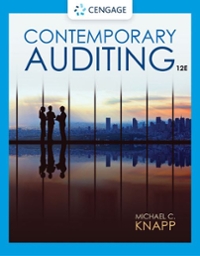Aaron Elrod spent the early years of his professional career in a large Sun Belt city working
Question:
Aaron Elrod spent the early years of his professional career in a large Sun Belt city working on the staff of a major accounting firm and then serving as an assistant controller for a municipal hospital.1,2 In their early thirties, Elrod and his wife decided they wanted a different lifestyle for themselves and their three children. After several months of searching for a new position, Elrod accepted an offer made to him by a CPA with whom he had become acquainted at local professional meetings. Elrod agreed to purchase the CPA's accounting practice in a small suburb 30 miles from the downtown business district, where he had worked for more than a decade. The purchase agreement required the seller to remain with the firm for three years to minimize client turnover. When Elrod assumed complete control of the firm following that transitional period, he had six full-time employees, including a receptionist and five accountants, three of whom were CPAs. Bookkeeping, compilation, and tax services accounted for the bulk of the firm's revenues.
Two years after Elrod acquired the accounting practice, a sharp economic downturn caused him to lose nearly one-third of his clients and lay off two of his professional employees. Making matters worse, over that same time frame, Elrod lost 80 percent of his personal savings. He had invested those funds in an undiversified portfolio of growth stocks that "tanked" during the sudden and severe business slump.
On a late Friday afternoon, as Elrod sat glumly at his desk, contemplating his bleak future, his receptionist brought a potential client to his door. "Hello, my name's Atkinson, Hollis Atkinson." Atkinson was a tall man with a sturdy physique and a firm handshake who spoke in a deep southern drawl. He was wearing a white button down shirt, starched blue jeans, and a frayed baseball cap. Immediately catching Elrod's attention were large, diamond-encrusted rings in the shape of a horseshoe that Atkinson wore on the pinkie finger of each hand.
"Sir, what can I do for you?"
"I'm lookin' for some help from an accountant."
"Well, you certainly came to the right place," Elrod responded as good-naturedly as possible, given the circumstances. "I am the most helpful accountant you will find in this area."
Questions
1. Identify the professional standards relevant to client acceptance decisions. What general principles do these standards suggest accounting firms should apply in arriving at client acceptance decisions? Identify specific measures accounting firms should take before deciding to accept a potential client.
2. Assume that you were Aaron Elrod. How would you have responded to the loan proposition laid out by Hollis Atkinson? Do CPAs have a professional or moral responsibility to report illegal acts committed by clients or potential clients?
3. Identify the parties affected by Elrod's decision to cooperate with Hollis Atkinson. What responsibility, if any, did Elrod have to each of those parties? Indicate how those parties were impacted by Elrod's decision.
4. Aaron Elrod did not intend to become involved in criminal activity when he met Hollis Atkinson. Instead, Atkinson goaded Elrod into becoming an active participant in his money-laundering scheme. Identify strategies CPAs can use to prevent themselves from stepping onto a "slippery slope" that may eventually result in them becoming involved in unethical, immoral, and possibly criminal conduct.
Step by Step Answer:






